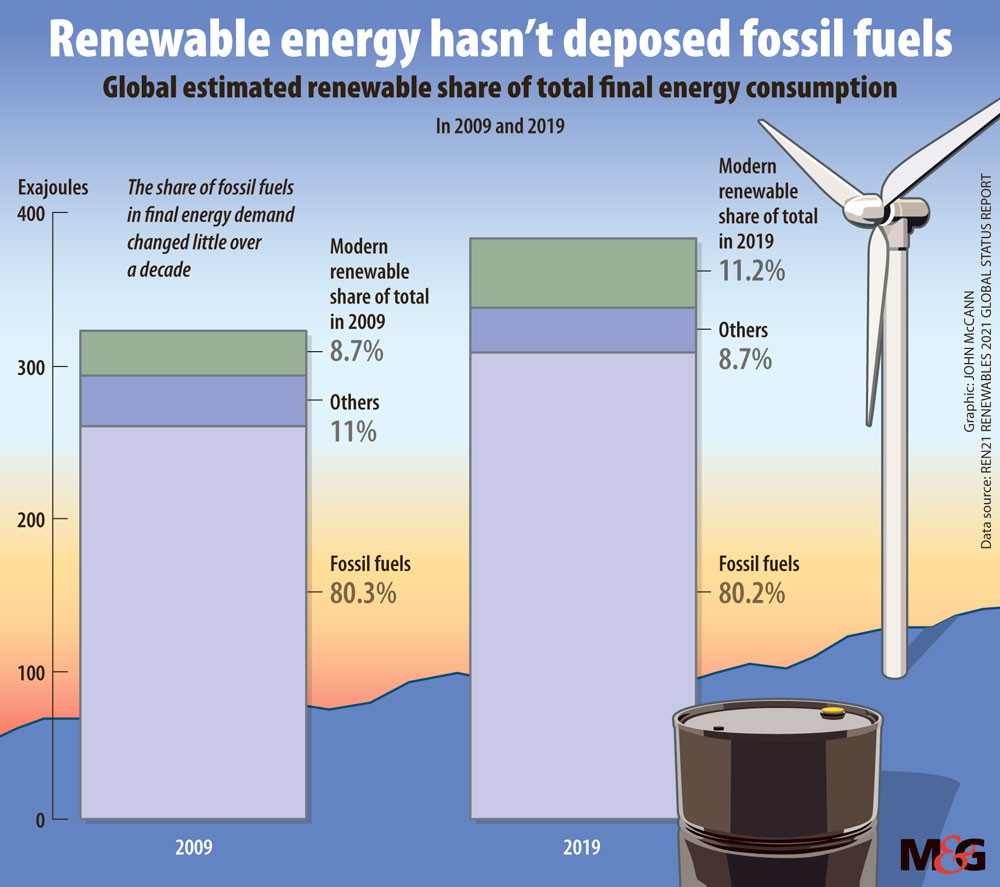(The Times/Esa Alexander)
The past decade of commitments to shift to low carbon renewable energy have yielded few results. A new report by the International Renewable Energy Agency (Irena) shows that Covid-19 financial recovery packages provide six times more investment to fossil fuels than to renewable energy.
“We are waking up to the bitter reality that the climate policy promises over the past 10 years have mostly been empty words,” said Rana Adib, the executive director of REN21, an international policy network focused on renewable energy policy.
“The share of fossil fuels in final energy consumption has not moved by an inch. Phasing them out and making renewables the new norm are the strongest actions we can take.”

The findings reflect that South Africa ranks first among African countries for the largest capacity for renewable energy, which currently takes up only 6% of total energy consumption.
The renewable energy transition is gaining pace because it makes business sense as well as environmental sense, said Sam Kimmins, the head of RE100, a global global corporate renewable energy initiative. “Renewable electricity is already creating millions of jobs, saving businesses money and providing energy access to millions. But businesses and governments need to go faster, not only for the environment, but to remain competitive in a renewably powered 21st century,” Kimmins said.
According to Irena, this year’s report raises a fundamental question: What is holding the world back from using the Covid crisis as an opportunity for transformation?
“Unfortunately, the harsh lesson from the pandemic is that most governments did not use the unique opportunity to further curtail carbon pollution and break the resistance of the fossil fuel incumbents,” said Stephan Singer, a senior adviser at the Climate Action Network of civil society groups in 130 countries. “What counts for them is corporate profit — neither the climate nor people’s health.”
On costs, researchers have found that the share of renewable energy that achieved lower costs than the most competitive fossil fuel option doubled in 2020.
The Irena report, Renewable Power Generation Costs in 2020, shows that costs for renewable technologies continued to fall significantly year on year.
Concentrating solar power fell by 16%, onshore wind by 13%, offshore wind by 9% and solar PV by 7%.
“Just 2020’s new renewable project additions will save emerging economies up to $156-billion over their lifespan,” the report’s authors said.
Francesco La Camera, the director general of Irena, said renewables present countries tied to coal with an economically attractive phase-out agenda that ensures they meet growing energy demand while saving costs, adding jobs, boosting growth and meeting climate ambition.
“I’m encouraged that more and more countries opt to power their economies with renewables and follow Irena’s pathway to reach net zero emissions by 2050,” he said.
“Among the most significant findings is that the renewable projects added last year will reduce costs in the electricity sector by at least $6-billion a year in emerging countries, relative to adding the same amount of fossil fuel-fired generation.”
Tunicia Phillips is an Adamela Trust climate and economic justice reporting fellow, funded by the Open Society Foundation for South Africa